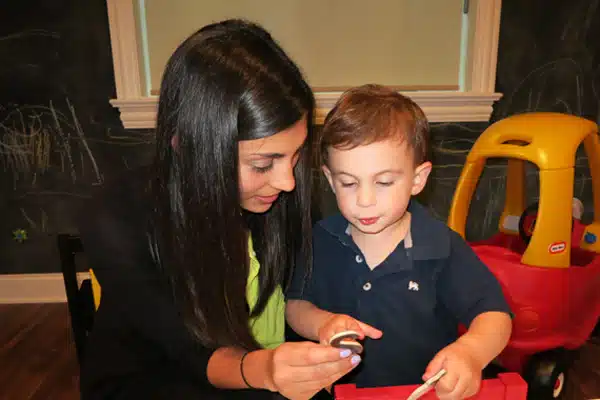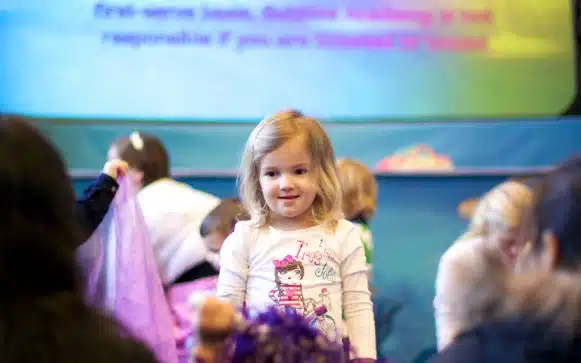When it comes to toddler language development, parents often ask us, “Is my child on the right track?” The short answer: every child grows at his or her own rate! This makes it increasingly difficult for parents to recognize when their toddler may have a delay in communication skills.
Although every child’s development looks a little bit different, you can reference the list below as a helpful guide as you navigate your 2-year-old’s speech and language development— “look who’s talking 2!”
Speech and Language Milestones: 2 years
(1) Expressive Vocabulary: By the time your child is 2 years old, he/she should produce between 200-300 words! Between the ages of 1-2, your child is experiencing a true “language explosion” and acquiring new words every day. Ensure that you are modeling words and labeling objects that your child encounters in the environment.
- You will want to make sure your child is using a variety of word types such as nouns, verbs, adjectives and pronouns.
(2) Combining two-word phrases: In the past, your child was primarily communicating using one word at a time (for example, “ball” if they want a ball). When children are 2 years old, their vocabulary is growing and they should begin to combine two words together to produce phrases. For example, your child may now say, “Want ball” if he or she is requesting a ball.
(3) Intelligibility: In general, a 2-year-old child should be approximately 50% intelligible to unfamiliar listeners. In other words, other adults should be able to understand your child about ½ of the time. You may have a much easier time understanding what your toddler is saying than an individual who does not have much exposure to his/her speech. Many 2-year-olds will continue to demonstrate articulation errors that are age appropriate (for example, substituting w for r – “wun” for run).
- Don’t be too concerned if your child is 50% intelligible but continues to have some developmental articulation errors. Contact Chicago Speech Spot for a complete list of age-appropriate articulation errors and other toddler language development questions.
(4) Growth in Receptive Language: Your child’s ability to understand language continues to grow. Around this age, a toddler should be able to follow one-step directions without gestural cues (e.g., “sit down”) and some simple two-step related directions (e.g., “Get the cup and bring it to the table”). Additionally, 2-year-olds can answer yes/no questions (e.g., “are you a girl?”) by nodding/shaking their head or providing a verbal response. Your child’s ability to answer simple wh- questions (e.g., “What is that?” or “Where is mommy?”) is emerging around this age as well. In terms of receptive vocabulary, your child should be able to understand around 300 or more words!
(5) Social Language: When your child turns 2, he/she will begin to show an increased interest in other children. Toddler language development includes social skills such as verbal turn taking, using social words (e.g., “hi,” “thank you” and “please”), engaging in parallel play and making wants known by pairing language with gestures.
- In regards to parallel play, it is not expected that your child play cooperatively with other children. However, by the age of 2, children play in close proximity to other children and demonstrate an interest in what other children are doing. Additionally, around age 2, children are able to make their wants known by pairing gestures with words (e.g., “want more”, “need help”, “I want ______”).
Please note that this toddler language development list is not all-inclusive.
If your child is younger, visit our post on speech development for 1-year-olds. Chicago Speech Spot conducted free Speech and Language Screenings at Bubbles Academy on November 21, 2013.

Michelle Hersh
Michelle Hersh (@SpeechSpot )is a licensed Speech-Language Pathologist and a co-founder ofChicago Speech Spot, a private pediatric speech therapy practice in Chicago. Chicago Speech Spot provides in-home and in-school speech-language therapy to children from birth to age 21. Michelle’s areas of specialty include (but are not limited to) articulation/phonological disorders, receptive/expressive language disorders, dyslexia, Childhood Apraxia of Speech and pragmatics/social language disorders. Michelle is trained in the PROMPT method for Childhood Apraxia Speech and has received her training in the evidence-based Orton-Gilingham reading program.
